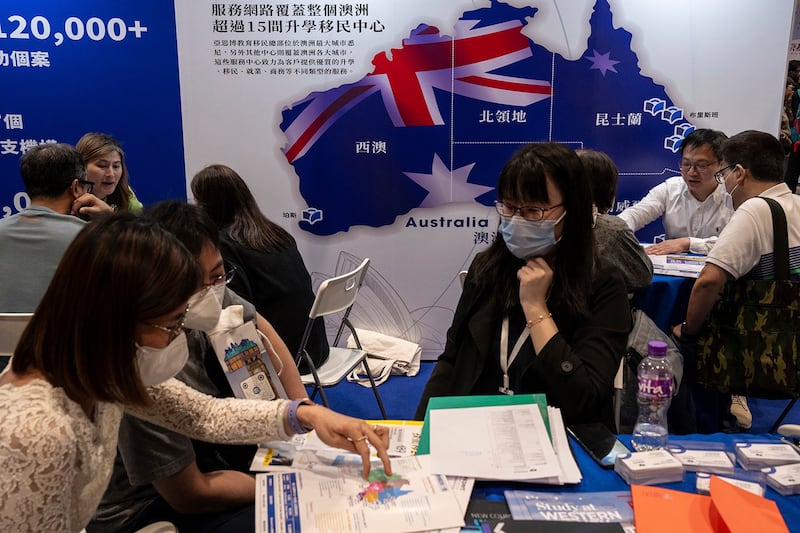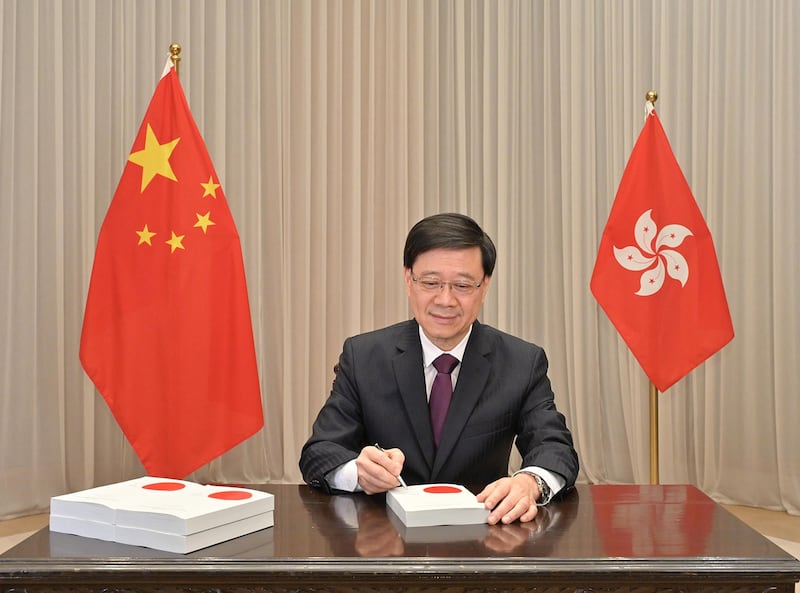As the Hong Kong government tries to reassure the city's 7 million residents that they have little to fear from the latest national security law, residents say they now live in greater fear of a misstep that could land them in jail.
The Safeguarding National Security Law, known as "Article 23," took effect on March 23, and has been billed by the government as a way to protect the city from interference and infiltration by " hostile foreign forces" that Beijing blames for waves of mass popular protests in recent years.
But its critics -- and some of the city's residents -- say they will now have to be far more careful about what they say in casual conversation or online.
"I used to get together regularly with a dozen or so friends to eat and chat for fun," a Hong Konger who gave only the surname Chow for fear of reprisals told RFA on Monday.
"I won't be inviting people to my home for dinner any more, or going to theirs, because I don't know if I can trust everyone I meet up with not to report me," she said. "I don't know if I could get into trouble for saying the wrong thing."
Chow said she has already thrown out all of her old copies of the pro-democracy Apple Daily, which was forced to shut down amid an investigation under the first national security law in 2021.
‘Soft confrontation’
Chow is also planning to spend some tourist dollars in the neighboring Chinese city of Shenzhen to demonstrate her patriotism and loyalty.
"It's to avoid being labeled by others, who might say I'm engaging in soft confrontation with the government," Chow said.

" Soft confrontation" is a term that has been used by Hong Kong officials including Chief Executive John Lee to justify the second round of national security legislation.
In January, Lee warned that "soft confrontation" could disguise itself as "so-called human rights, freedom, democracy and people's livelihood," and said the city needed the law to protect itself against "hostile forces" waiting to pounce.
Pro-democracy media mogul Jimmy Lai is currently on trial for "collusion with foreign forces" under the 2020 National Security Law -- the case against him relies heavily on opinion articles published in his flagship Apple Daily newspaper.
Self-censorship
A former 2019 protester who gave only the surname Tin for fear of reprisals said she had been careful not to criticize Article 23 in public because she feels that the risk of arrest just got a lot higher with the new law.
"There are so many ways that they can get you under Article 23 that you have to censor yourself," Tin said, citing a recent exchange at her place of work, in which a colleague was shushed for criticizing John Lee's appearance.
"Someone said something critical about John Lee's appearance, and another person immediately warned them not to, saying we need to be careful not to break the law once Article 23 is passed," she said. "Everyone immediately fell silent."
Tin said that while everyone knows that self-censorship isn't ideal, they will do it anyway.
"The only silver lining is that we know self-censorship is wrong -- we don't yet completely accept it as they do in mainland China," she said.
‘Rebuttal team’
The government launched a "rebuttal team" in January to hit back at international criticism of the new law, and has been busy sending officials out to reassure people in media interviews since.
On Monday, Justice Secretary Paul Lam set out to reassure people that journalists wouldn't be targeted simply for reporting criticism of the Hong Kong authorities.
"Anyone carrying out sincere journalistic work has absolutely no need to worry," Lam told a local radio show, without explaining how such "sincerity" would be measured by the authorities.
"Sometimes it's important to report comments that are unfriendly to Hong Kong ... but the purpose should be to let us know so we can deal with it," Lam said.

A Hong Kong journalist who gave only the nickname Chin for fear of reprisals said he feels under far more pressure than he did before the Article 23 legislation took effect.
"It feels like the calm before the storm," Chin said. "I'd be lying if I said I wasn't under any pressure."
"As I continue to work in the media, I will ... be constantly assessing the risks and making professional judgments, to make sure I'm doing what I'm supposed to do," he said.
Quieting criticism
Meanwhile, Lam has also warned that anyone who "relentlessly" reposts critical comments online could be targeted.
“[W]hen someone publishes criticism relentlessly, even if they have been told why their criticism is unreasonable or why it wouldn’t be accepted ... then I would begin to have a doubt: Are they actually making criticism?” Lam said in comments reported by the Hong Kong Free Press.
A Hong Kong resident surnamed Hui said he would be making some changes too, but said he would keep viewing overseas media content on YouTube that was critical of the government.
Secretary for Security Chris Tang has also been defending the new security law in public, claiming in a statement on Friday that it won't affect "normal business operations" in the city.
"Law-abiding persons (including US businessmen and enterprises in Hong Kong and US travelers visiting Hong Kong) will not engage in acts and activities endangering our national security and will not unwittingly violate the law," Tang said in a statement on March 23.
But an accountant in a logistics company who gave the pseudonym Avis for fear of reprisals said his employer has warned colleagues to be careful what they do and say, now that the law has taken effect.
But he said that's not always straightforward.
"It's not always clear when doing business whether a client has done something to violate national security laws," Avis said.
He said it will likely mean a lot more due diligence to ensure the company isn't put at risk by its business contacts.
"You can lose a lot of business opportunities if you have to take a lot of care to know the other party very well before acting," he said.
A civil servant who gave only the nickname Ming said it's too soon to say how much their work will be affected, however.
"I won't be talking to my colleagues about Article 23," he said. "We will just get on with our work, and there won't be any discussion of it."
"It's not for us to comment, right?"
Translated by Luisetta Mudie. Edited by Malcolm Foster.
